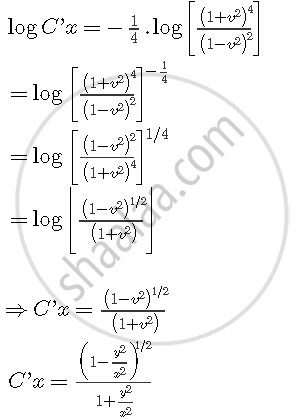Advertisements
Advertisements
प्रश्न
Prove that x2 – y2 = c(x2 + y2)2 is the general solution of the differential equation (x3 – 3xy2)dx = (y3 – 3x2y)dy, where C is parameter
उत्तर
The given equation is:
(x3 – 3xy2)dx = (y3 – 3x2y)dy
`=> (dy)/(dx) = (x^3 - 3xy^2)/(y^3 - 3x^2y)`
which is a homogeneous equation.therefore substituting y=vx




संबंधित प्रश्न
Show that the differential equation 2yx/y dx + (y − 2x ex/y) dy = 0 is homogeneous. Find the particular solution of this differential equation, given that x = 0 when y = 1.
Show that the given differential equation is homogeneous and solve them.
`(1+e^(x/y))dx + e^(x/y) (1 - x/y)dy = 0`
For the differential equation find a particular solution satisfying the given condition:
`dy/dx - y/x + cosec (y/x) = 0; y = 0` when x = 1
Find the particular solution of the differential equation `(x - y) dy/dx = (x + 2y)` given that y = 0 when x = 1.
(x2 + 3xy + y2) dx − x2 dy = 0
Solve the following initial value problem:
(x2 + y2) dx = 2xy dy, y (1) = 0
Solve the following initial value problem:
\[\frac{dy}{dx} - \frac{y}{x} + cosec\frac{y}{x} = 0, y\left( 1 \right) = 0\]
Solve the following initial value problem:
(y4 − 2x3 y) dx + (x4 − 2xy3) dy = 0, y (1) = 1
Solve the following initial value problem:
\[\left\{ x \sin^2 \left( \frac{y}{x} \right) - y \right\}dx + x dy = 0, y\left( 1 \right) = \frac{\pi}{4}\]
Find the particular solution of the differential equation x cos\[\left( \frac{y}{x} \right)\frac{dy}{dx} = y \cos\left( \frac{y}{x} \right) + x\], given that when x = 1, \[y = \frac{\pi}{4}\]
Find the particular solution of the differential equation \[\left( x - y \right)\frac{dy}{dx} = x + 2y\], given that when x = 1, y = 0.
Show that the family of curves for which \[\frac{dy}{dx} = \frac{x^2 + y^2}{2xy}\], is given by \[x^2 - y^2 = Cx\]
A homogeneous differential equation of the form \[\frac{dx}{dy} = h\left( \frac{x}{y} \right)\] can be solved by making the substitution
Which of the following is a homogeneous differential equation?
Solve the following differential equation : \[\left[ y - x \cos\left( \frac{y}{x} \right) \right]dy + \left[ y \cos\left( \frac{y}{x} \right) - 2x \sin\left( \frac{y}{x} \right) \right]dx = 0\] .
Solve the differential equation: ` (dy)/(dx) = (x + y )/ (x - y )`
Solve the following differential equation:
`x * dy/dx - y + x * sin(y/x) = 0`
Solve the following differential equation:
`(1 + "e"^("x"/"y"))"dx" + "e"^("x"/"y")(1 - "x"/"y")"dy" = 0`
Solve the following differential equation:
`"xy" "dy"/"dx" = "x"^2 + "2y"^2, "y"(1) = 0`
Solve the following differential equation:
`"x"^2 "dy"/"dx" = "x"^2 + "xy" + "y"^2`
Solve the following differential equation:
(x2 + 3xy + y2)dx - x2 dy = 0
Which of the following is not a homogeneous function of x and y.
F(x, y) = `(sqrt(x^2 + y^2) + y)/x` is a homogeneous function of degree ______.
Let the solution curve of the differential equation `x (dy)/(dx) - y = sqrt(y^2 + 16x^2)`, y(1) = 3 be y = y(x). Then y(2) is equal to ______.
The differential equation y' = `y/(x + sqrt(xy))` has general solution given by:
(where C is a constant of integration)
Find the general solution of the differential equation:
(xy – x2) dy = y2 dx
Read the following passage:
|
An equation involving derivatives of the dependent variable with respect to the independent variables is called a differential equation. A differential equation of the form `dy/dx` = F(x, y) is said to be homogeneous if F(x, y) is a homogeneous function of degree zero, whereas a function F(x, y) is a homogeneous function of degree n if F(λx, λy) = λn F(x, y). To solve a homogeneous differential equation of the type `dy/dx` = F(x, y) = `g(y/x)`, we make the substitution y = vx and then separate the variables. |
Based on the above, answer the following questions:
- Show that (x2 – y2) dx + 2xy dy = 0 is a differential equation of the type `dy/dx = g(y/x)`. (2)
- Solve the above equation to find its general solution. (2)
